
ai-playground
Code from tutorials presented on the "Code AI with Rok" YouTube channel
Stars: 233
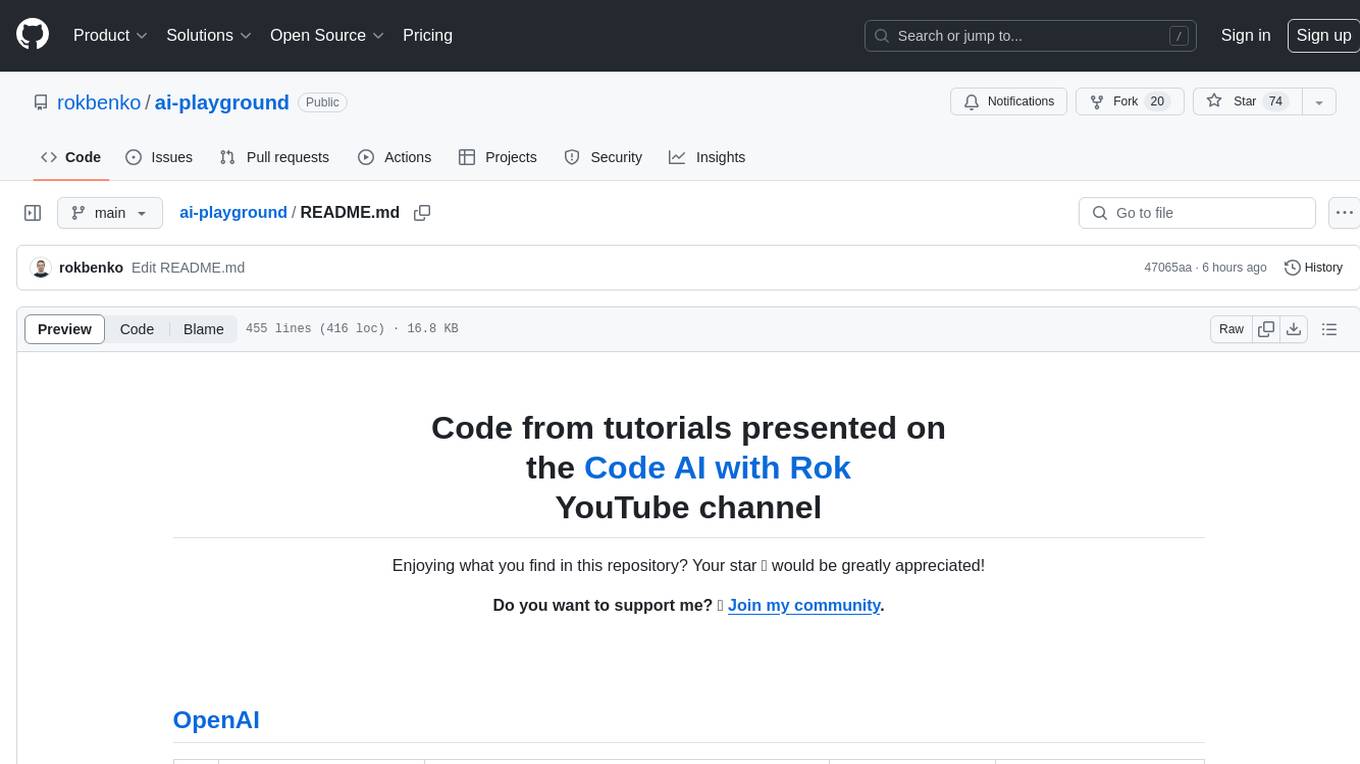
The ai-playground repository contains code from tutorials presented on the Code AI with Rok YouTube channel. It includes tutorials on using the OpenAI Assistants API v1 beta to build personal math tutors, customer support chatbots, and more. Additionally, there are tutorials on using Gemini Pro API, Snowflake Cortex LLM functions, LlamaIndex chat streaming app, Fetch.ai uAgents, Milvus Standalone, spaCy for NER, and more. The repository aims to provide practical examples and guides for developers interested in AI-related projects and tools.
README:
Code from YouTube channel
Code AI with Rok
Found something awesome here?
Star this repo and help me hit 250 ⭐!
Table of contents
| Tutorial title | Tutorial description | Tech stack | Links | ||
|---|---|---|---|---|---|
| #1 | Response in JSON format | Python and Node.js examples on how to get a JSON response using the OpenAI Chat Completions API |



|
GitHub | YouTube |
| #2 |
Personal Math Tutor* *Assistants API v1 beta
|
Python and Node.js examples on how to build a Personal Math Tutor using the OpenAI Assistants API v1 beta with the Code Interpreter tool |



|
GitHub | YouTube |
| #3 |
GUI for the Personal Math Tutor* *Assistants API v1 beta
|
Next.js GUI for the #2 Personal Math Tutor tutorial |



|
GitHub | YouTube |
| #4 |
Customer Support Chatbot* *Assistants API v1 beta
|
Python and Node.js examples on how to build a Customer Support Chatbot using the OpenAI Assistants API v1 beta with the Knowledge Retrieval tool |



|
GitHub | YouTube |
| #5 |
TUI for the Customer Support Chatbot* *Assistants API v1 beta
|
Python and Node.js TUIs for the #4 Customer Support Chatbot tutorial |



|
GitHub | YouTube |
| #6 |
TUI for the Customer Support Chatbot with response streaming* *Assistants API v1 beta
|
Python and Node.js TUIs for the #4 Customer Support Chatbot tutorial with response streaming |



|
GitHub | YouTube |
| #7 |
TUI for assistants: response polling vs. streaming* *Assistants API v2 beta
|
Python and Node.js TUIs for assistants to show the difference between response polling (manual or with a helper) and streaming (with a helper) |



|
GitHub | YouTube |
| #8 | LLMs explained | Python and Node.js examples on how LLMs work using the OpenAI SDK top_logprobs parameter |



|
GitHub | YouTube |
| Tutorial title | Tutorial description | Tech stack | Links | ||
|---|---|---|---|---|---|
| #1 | Gemini Pro API starter | Python and Node.js examples on how to use the Gemini Pro API |



|
GitHub | YouTube |
| Tutorial title | Tutorial description | Tech stack | Links | ||
|---|---|---|---|---|---|
| #1 | Create Llama app with 1 command in 2 minutes | Instructions on how to create a LlamaIndex chat streaming app using Next.js GUI and OpenAI LLM with 1 command in 2 minutes |

|
GitHub | YouTube |
| #2 | GUI for a Travel Recommendation RAG | Streamlit GUI for a Travel Recommendation RAG with response streaming using LlamaIndex and OpenAI LLM |

|
GitHub | YouTube |
| #3 | Eval of the Travel Recommendation RAG | Evaluation of the #2 GUI for a Travel Recommendation RAG tutorial |

|
GitHub | YouTube |
| Tutorial title | Tutorial description | Tech stack | Links | ||
|---|---|---|---|---|---|
| #1 | TUI for a LangGraph agent with a web connection | Python and Node.js TUIs for a LangGraph ReAct agent using OpenAI LLM and Tavily tool to get a web connection |



|
GitHub | YouTube |
| #2 | TUI for a LangGraph agent with memory | Add memory to the #1 TUI for a LangGraph agent with a web connection tutorial |



|
GitHub | YouTube |
| #3 | TUI for a LangGraph agent with persistent memory using PostgreSQL | Add persistent memory using PostgreSQL to the #1 TUI for a LangGraph agent with a web connection tutorial |

|
GitHub | YouTube |
| #4 | TUI for a LangGraph agent with persistent memory using PostgreSQL with pgvector | Add persistent memory using PostgreSQL with pgvector to the #1 TUI for a LangGraph agent with a web connection tutorial |

|
GitHub | YouTube |
| Tutorial title | Tutorial description | Tech stack | Links | ||
|---|---|---|---|---|---|
| #1 | Podcast prepper | Python example using CrewAI, Anthropic LLM and Exa tool, designed for podcast hosts, helping them:
|

|
GitHub | YouTube |
| Tutorial title | Tutorial description | Tech stack | Links | ||
|---|---|---|---|---|---|
| #1 | uAgents starter |
Python examples on how to:
|

|
GitHub | YouTube |
| #2 | uAgents communication | Python examples on how to make Fetch.ai agents communicate with each other locally or remotely using Almanac contracts |

|
GitHub | YouTube |
| Tutorial title | Tutorial description | Tech stack | Links | ||
|---|---|---|---|---|---|
| #1 | Vertex AI Gemini Pro API starter | Python and Node.js examples on how to use the Vertex AI Gemini Pro API |



|
GitHub | YouTube |
| Tutorial title | Tutorial description | Tech stack | Links | ||
|---|---|---|---|---|---|
| #1 | Snowflake Cortex LLM functions starter | Python example on how to use the Snowflake Cortex LLM functions |

|
GitHub | YouTube |
| Tutorial title | Tutorial description | Tech stack | Links | ||
|---|---|---|---|---|---|
| #1 | LangSmith observability starter | Add observability using LangSmith to the #3 TUI for a LangGraph agent with persistent memory using PostgreSQL tutorial |

|
GitHub | YouTube |
| Tutorial title | Tutorial description | Tech stack | Links | ||
|---|---|---|---|---|---|
| #1 | Milvus Standalone starter | Python and Node.js examples on how to install Milvus Standalone using Docker, connect to a Milvus Standalone server and list all Milvus collections |




|
GitHub | YouTube |
| #2 | Attu starter | Instructions on how to run Attu, a GUI for Milvus Standalone, using Docker |

|
GitHub | YouTube |
| #3 | Text similarity search | Python example on how to do text similarity search with Milvus Standalone |


|
GitHub | YouTube |
| Tutorial title | Tutorial description | Tech stack | Links | ||
|---|---|---|---|---|---|
| #1 | Add a new entity label to NER | Jupyter Notebook example on how to add a new entity label to spaCy's default NER model |

|
GitHub | YouTube |
Thank you for considering contributing to my repository. While I don't accept direct additions of tutorials, I warmly welcome contributions in the following forms:
- Reporting major issues: Found a bug, or error? Feel free to open an issue on GitHub. Be sure to provide as much detail as possible, including steps to reproduce the issue.
- Fixing minor issues: Found a typo, grammatical error, or other small issue? Feel free to open a pull request to fix them directly.
- Making suggestions: Have an idea how I can enhance my tutorials or topics I should cover? Share your thoughts by creating a new issue outlining your suggestion. I'll carefully consider all reasonable ideas.
To contribute:
- Fork this repository.
- Make your desired changes.
- Create a commit and push the changes.
- Create a pull request.
I'll review your pull request and get back to you as soon as possible.
This project is open source and available under the MIT license.
For Tasks:
Click tags to check more tools for each tasksFor Jobs:
Alternative AI tools for ai-playground
Similar Open Source Tools

ai-playground
The ai-playground repository contains code from tutorials presented on the Code AI with Rok YouTube channel. It includes tutorials on using the OpenAI Assistants API v1 beta to build personal math tutors, customer support chatbots, and more. Additionally, there are tutorials on using Gemini Pro API, Snowflake Cortex LLM functions, LlamaIndex chat streaming app, Fetch.ai uAgents, Milvus Standalone, spaCy for NER, and more. The repository aims to provide practical examples and guides for developers interested in AI-related projects and tools.
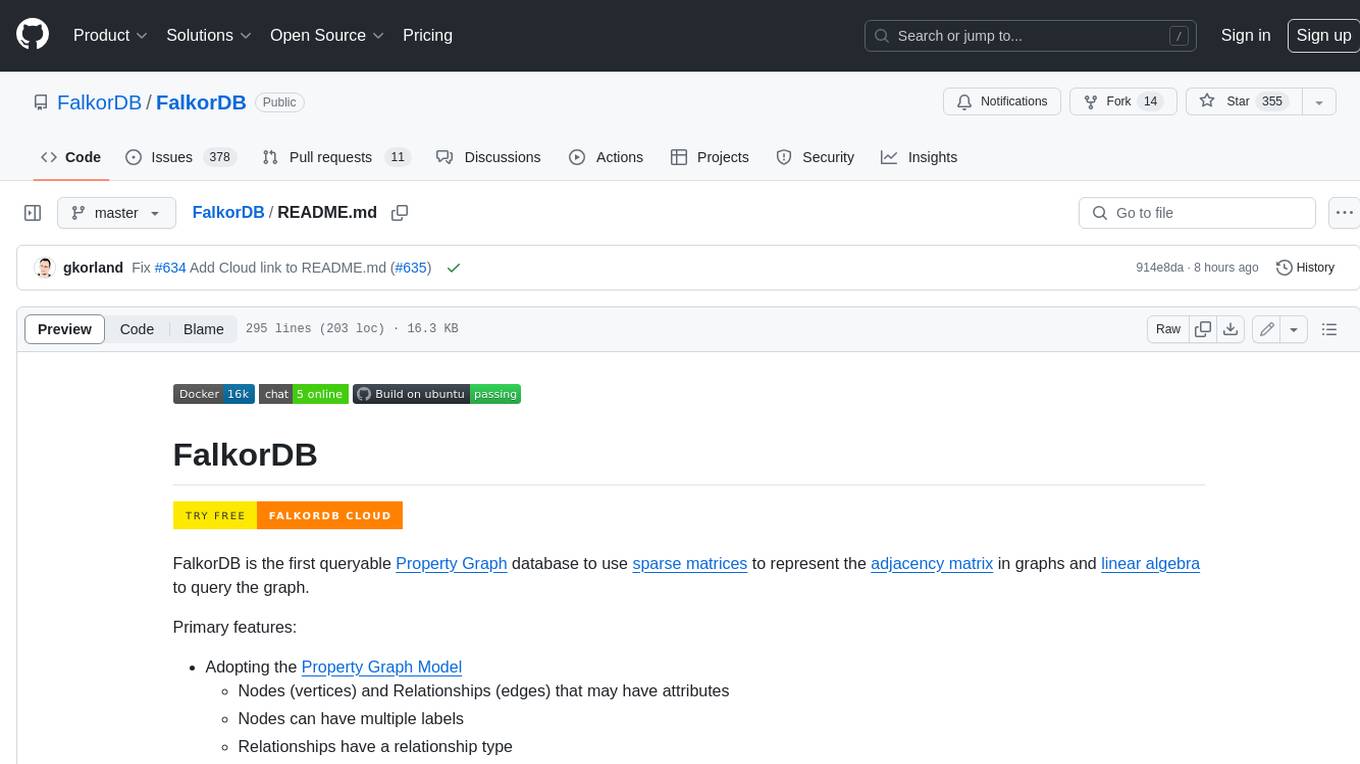
FalkorDB
FalkorDB is the first queryable Property Graph database to use sparse matrices to represent the adjacency matrix in graphs and linear algebra to query the graph. Primary features: * Adopting the Property Graph Model * Nodes (vertices) and Relationships (edges) that may have attributes * Nodes can have multiple labels * Relationships have a relationship type * Graphs represented as sparse adjacency matrices * OpenCypher with proprietary extensions as a query language * Queries are translated into linear algebra expressions
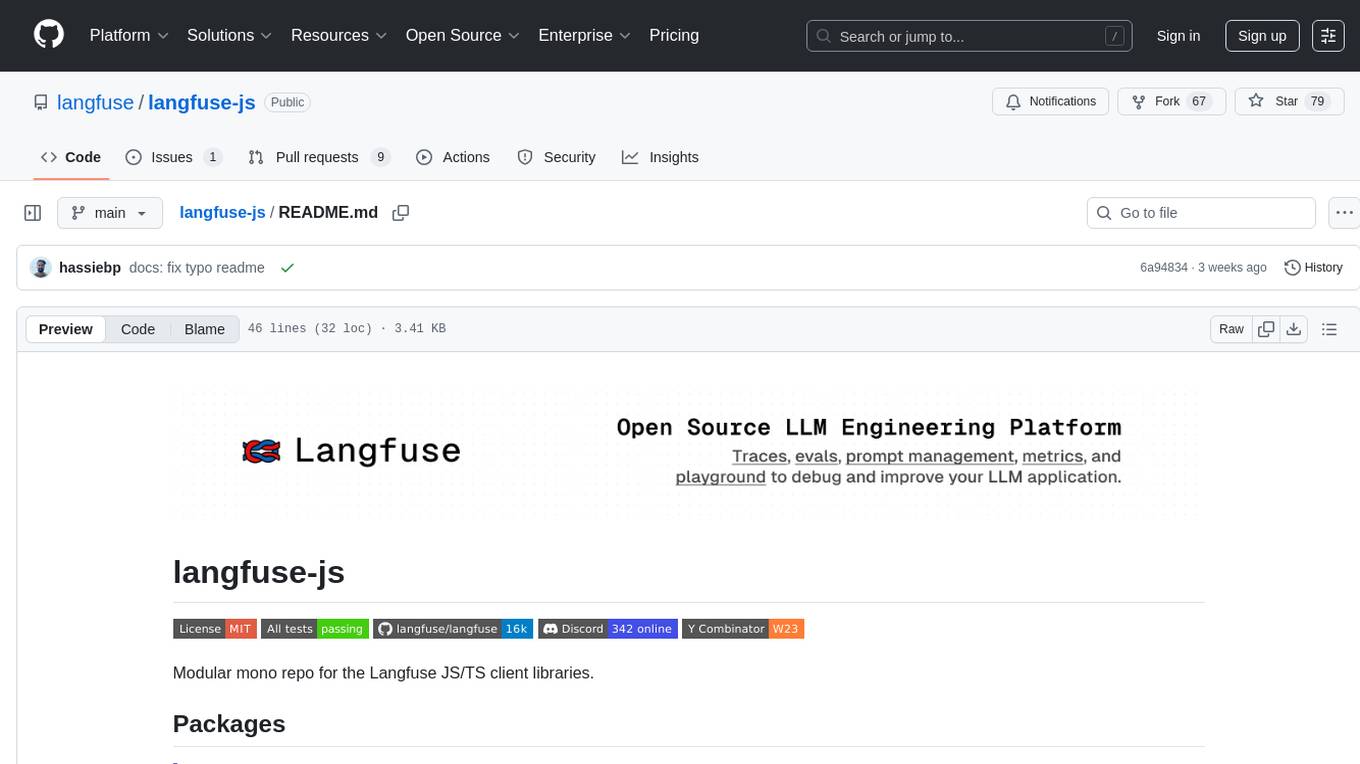
langfuse-js
langfuse-js is a modular mono repo for the Langfuse JS/TS client libraries. It includes packages for Langfuse API client, tracing, OpenTelemetry export helpers, OpenAI integration, and LangChain integration. The SDK is currently in version 4 and offers universal JavaScript environments support as well as Node.js 20+. The repository provides documentation, reference materials, and development instructions for managing the monorepo with pnpm. It is licensed under MIT.
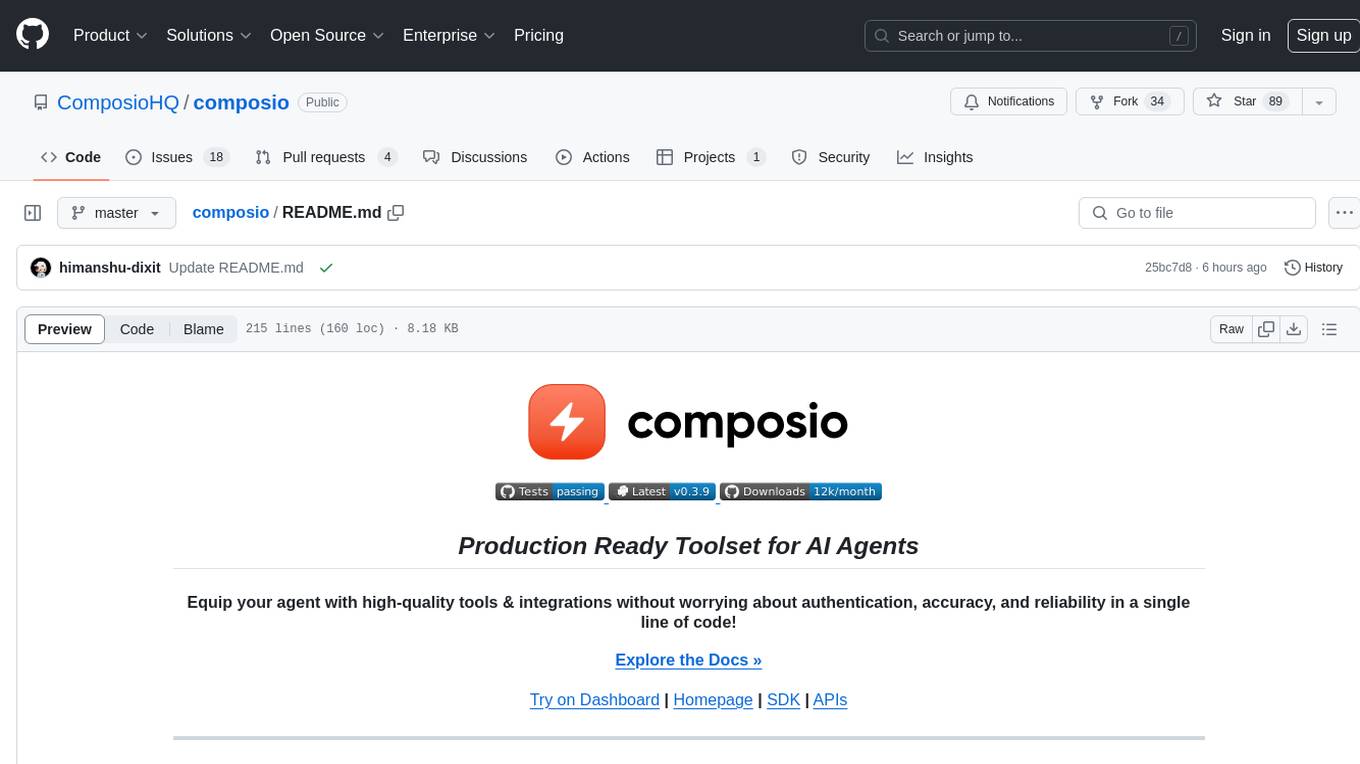
composio
Composio is a production-ready toolset for AI agents that enables users to integrate AI agents with various agentic tools effortlessly. It provides support for over 100 tools across different categories, including popular softwares like GitHub, Notion, Linear, Gmail, Slack, and more. Composio ensures managed authorization with support for six different authentication protocols, offering better agentic accuracy and ease of use. Users can easily extend Composio with additional tools, frameworks, and authorization protocols. The toolset is designed to be embeddable and pluggable, allowing for seamless integration and consistent user experience.
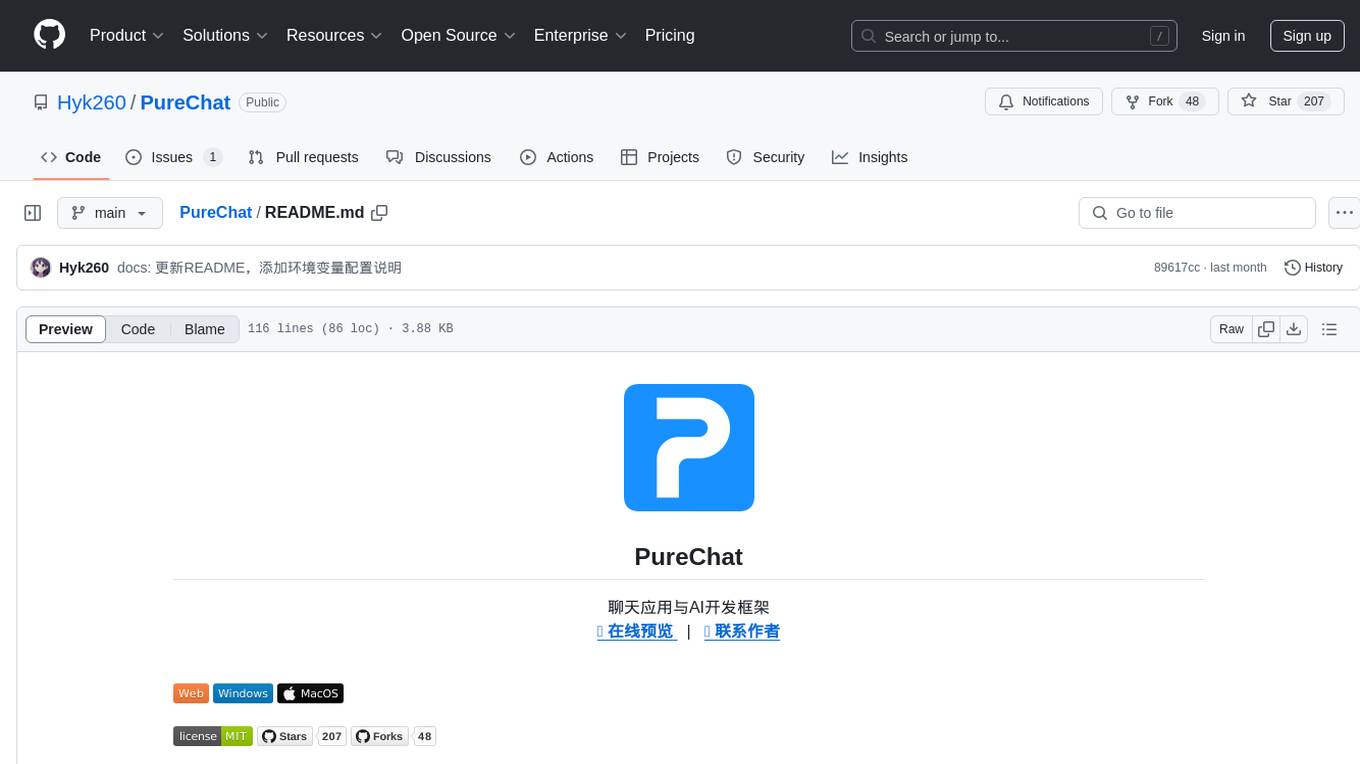
PureChat
PureChat is a chat application integrated with ChatGPT, featuring efficient application building with Vite5, screenshot generation and copy support for chat records, IM instant messaging SDK for sessions, automatic light and dark mode switching based on system theme, Markdown rendering, code highlighting, and link recognition support, seamless social experience with GitHub quick login, integration of large language models like ChatGPT Ollama for streaming output, preset prompts, and context, Electron desktop app versions for macOS and Windows, ongoing development of more features. Environment setup requires Node.js 18.20+. Clone code with 'git clone https://github.com/Hyk260/PureChat.git', install dependencies with 'pnpm install', start project with 'pnpm dev', and build with 'pnpm build'.
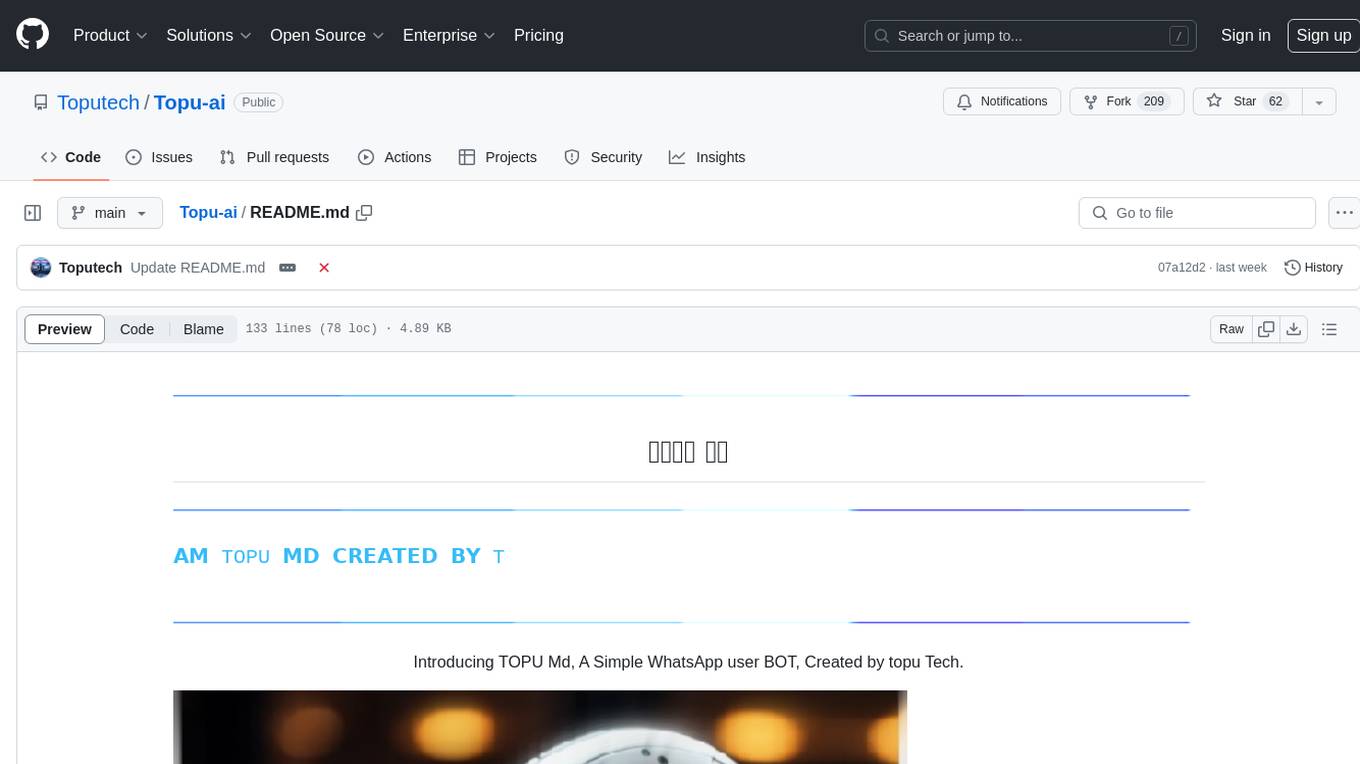
Topu-ai
TOPU Md is a simple WhatsApp user bot created by Topu Tech. It offers various features such as multi-device support, AI photo enhancement, downloader commands, hidden NSFW commands, logo commands, anime commands, economy menu, various games, and audio/video editor commands. Users can fork the repo, get a session ID by pairing code, and deploy on Heroku. The bot requires Node version 18.x or higher for optimal performance. Contributions to TOPU-MD are welcome, and the tool is safe for use on WhatsApp and Heroku. The tool is licensed under the MIT License and is designed to enhance the WhatsApp experience with diverse features.
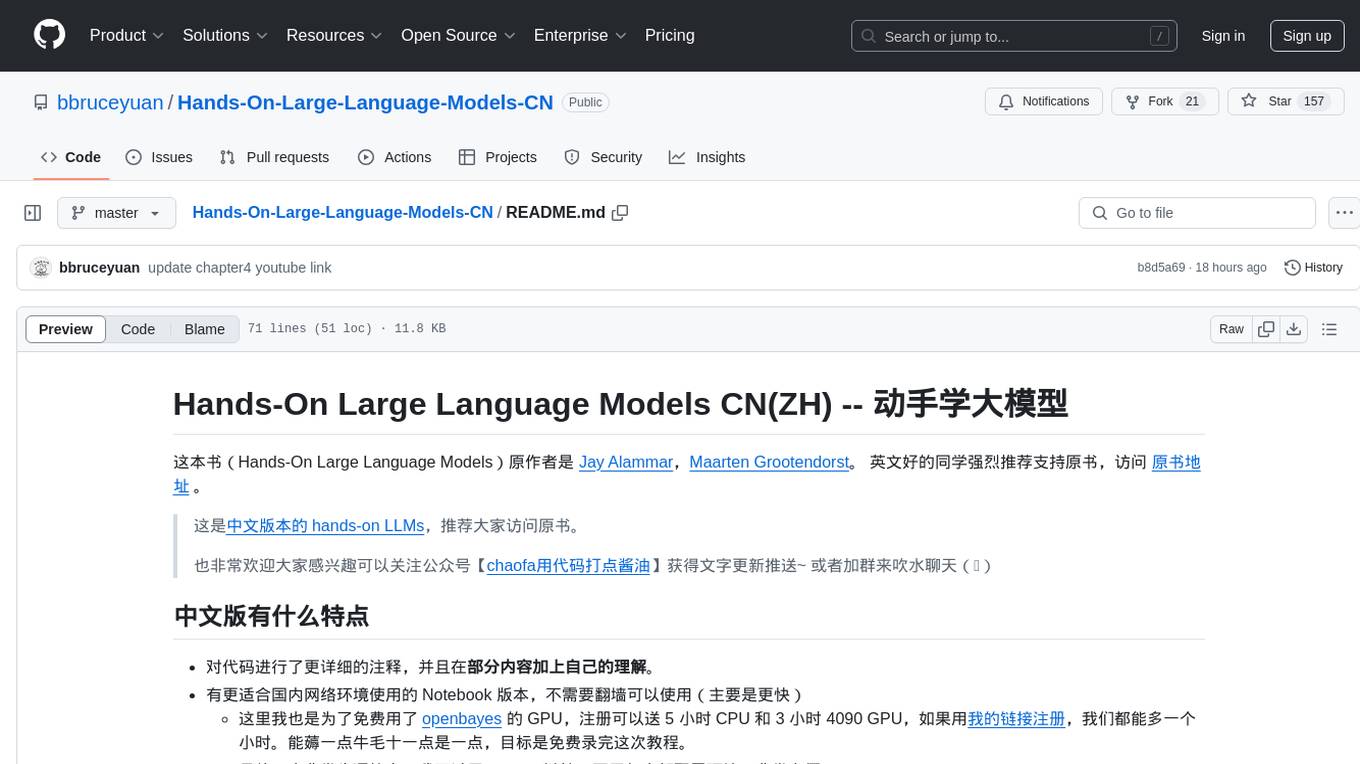
Hands-On-Large-Language-Models-CN
Hands-On Large Language Models CN(ZH) is a Chinese version of the book 'Hands-On Large Language Models' by Jay Alammar and Maarten Grootendorst. It provides detailed code annotations and additional insights, offers Notebook versions suitable for Chinese network environments, utilizes openbayes for free GPU access, allows convenient environment setup with vscode, and includes accompanying Chinese language videos on platforms like Bilibili and YouTube. The book covers various chapters on topics like Tokens and Embeddings, Transformer LLMs, Text Classification, Text Clustering, Prompt Engineering, Text Generation, Semantic Search, Multimodal LLMs, Text Embedding Models, Fine-tuning Models, and more.

chatluna
Chatluna is a machine learning model plugin that provides chat services with large language models. It is highly extensible, supports multiple output formats, and offers features like custom conversation presets, rate limiting, and context awareness. Users can deploy Chatluna under Koishi without additional configuration. The plugin supports various models/platforms like OpenAI, Azure OpenAI, Google Gemini, and more. It also provides preset customization using YAML files and allows for easy forking and development within Koishi projects. However, the project lacks web UI, HTTP server, and project documentation, inviting contributions from the community.
helicone
Helicone is an open-source observability platform designed for Language Learning Models (LLMs). It logs requests to OpenAI in a user-friendly UI, offers caching, rate limits, and retries, tracks costs and latencies, provides a playground for iterating on prompts and chat conversations, supports collaboration, and will soon have APIs for feedback and evaluation. The platform is deployed on Cloudflare and consists of services like Web (NextJs), Worker (Cloudflare Workers), Jawn (Express), Supabase, and ClickHouse. Users can interact with Helicone locally by setting up the required services and environment variables. The platform encourages contributions and provides resources for learning, documentation, and integrations.
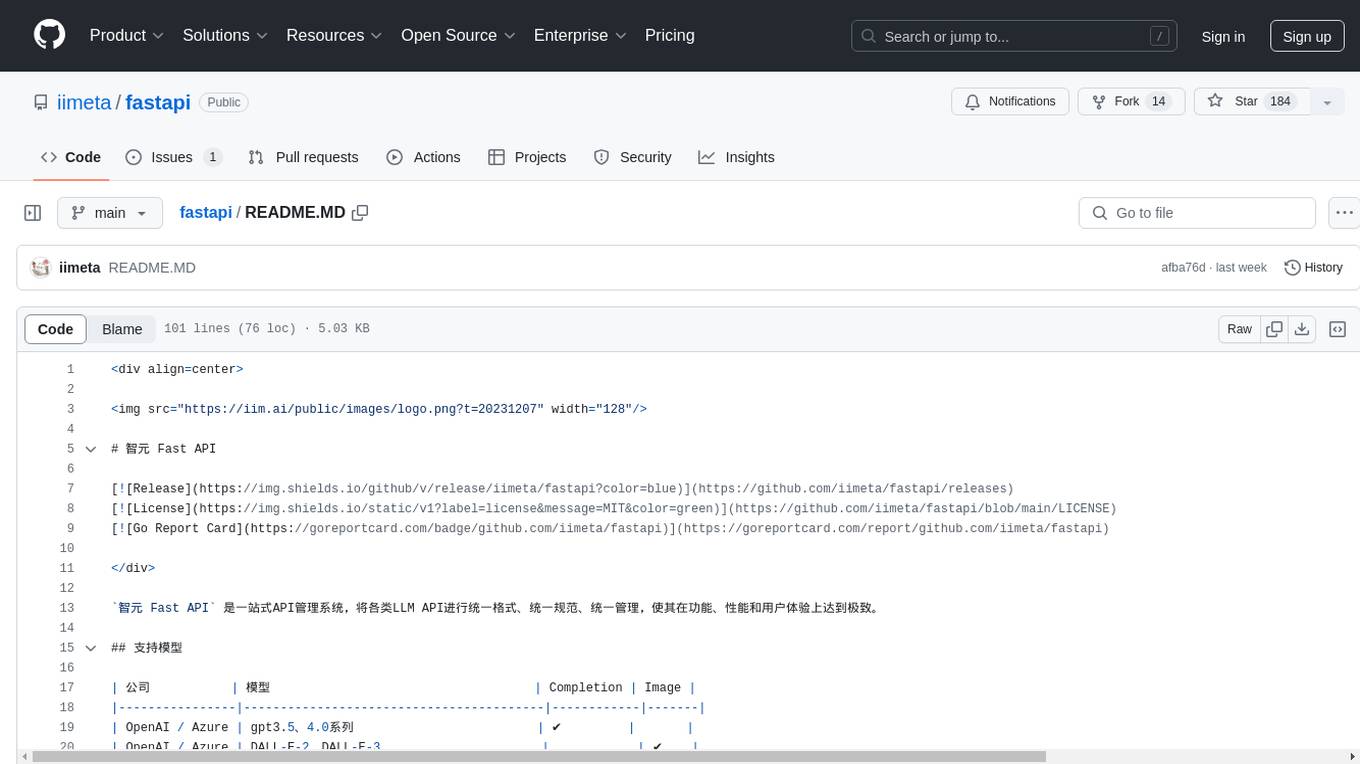
fastapi
智元 Fast API is a one-stop API management system that unifies various LLM APIs in terms of format, standards, and management, achieving the ultimate in functionality, performance, and user experience. It supports various models from companies like OpenAI, Azure, Baidu, Keda Xunfei, Alibaba Cloud, Zhifu AI, Google, DeepSeek, 360 Brain, and Midjourney. The project provides user and admin portals for preview, supports cluster deployment, multi-site deployment, and cross-zone deployment. It also offers Docker deployment, a public API site for registration, and screenshots of the admin and user portals. The API interface is similar to OpenAI's interface, and the project is open source with repositories for API, web, admin, and SDK on GitHub and Gitee.
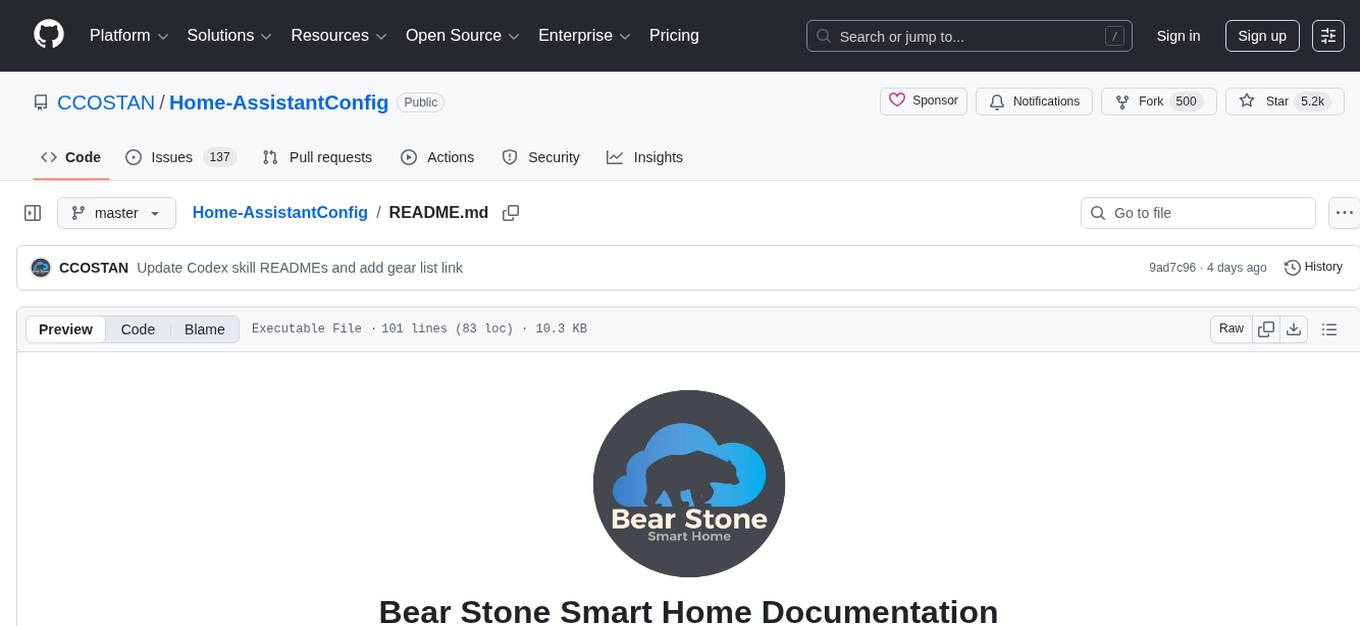
Home-AssistantConfig
Bear Stone Smart Home Documentation is a live, personal Home Assistant configuration shared for browsing and inspiration. It provides real-world automations, scripts, and scenes for users to reverse-engineer patterns and adapt to their own setups. The repository layout includes reusable config under `config/`, with runtime artifacts hidden by `.gitignore`. The platform runs on Docker/compose, and featured examples cover various smart home scenarios like alarm monitoring, lighting control, and presence awareness. The repository also includes a network diagram and lists Docker add-ons & utilities, gear tied to real automations, and affiliate links for supported hardware.
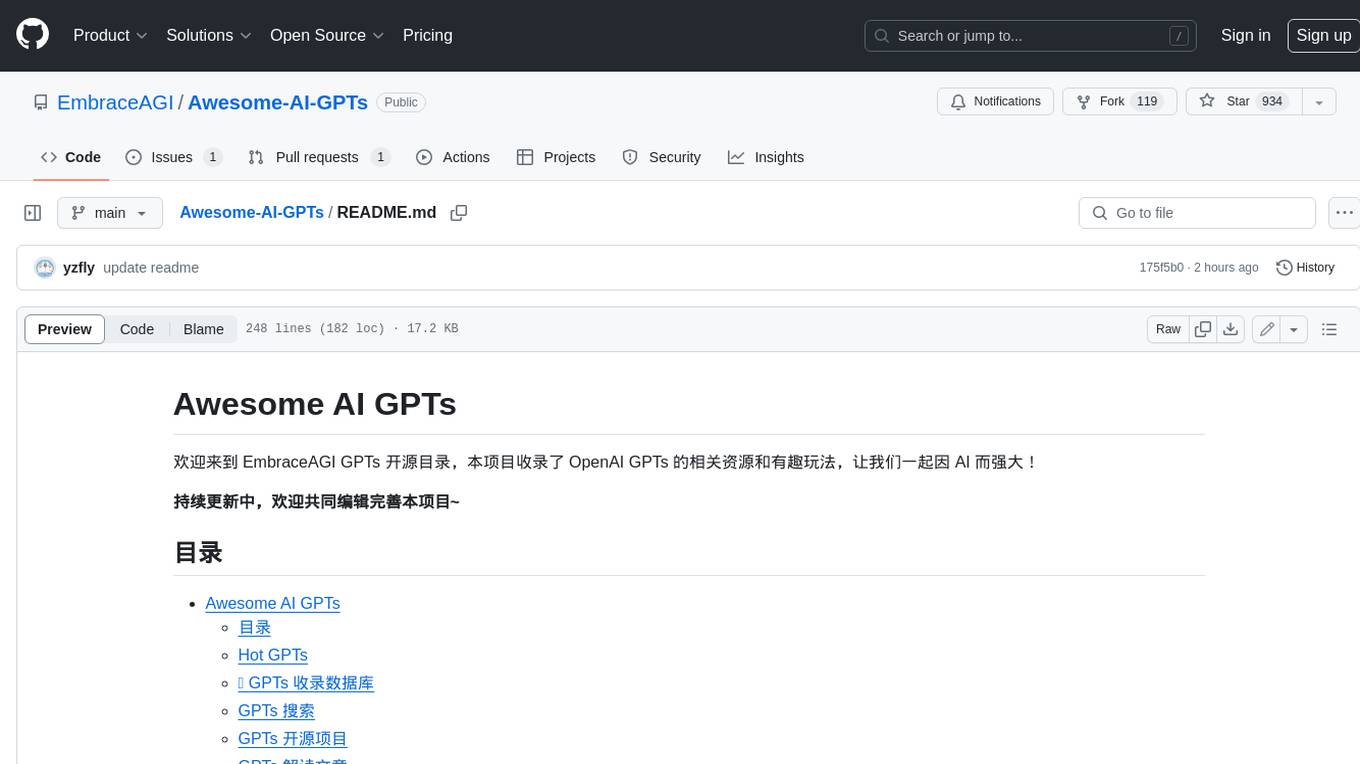
Awesome-AI-GPTs
Awesome AI GPTs is an open repository that collects resources and fun ways to use OpenAI GPTs. It includes databases, search tools, open-source projects, articles, attack and defense strategies, installation of custom plugins, knowledge bases, and community interactions related to GPTs. Users can find curated lists, leaked prompts, and various GPT applications in this repository. The project aims to empower users with AI capabilities and foster collaboration in the AI community.
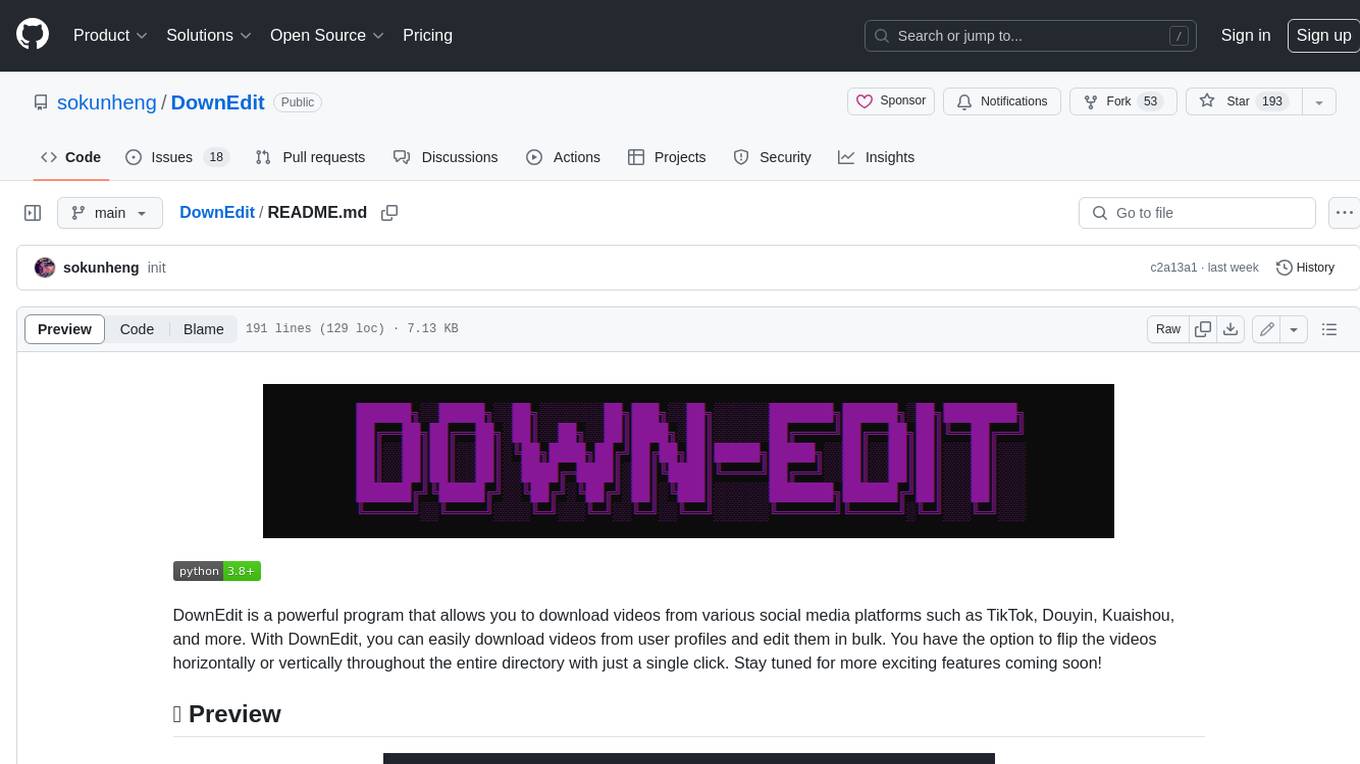
DownEdit
DownEdit is a powerful program that allows you to download videos from various social media platforms such as TikTok, Douyin, Kuaishou, and more. With DownEdit, you can easily download videos from user profiles and edit them in bulk. You have the option to flip the videos horizontally or vertically throughout the entire directory with just a single click. Stay tuned for more exciting features coming soon!
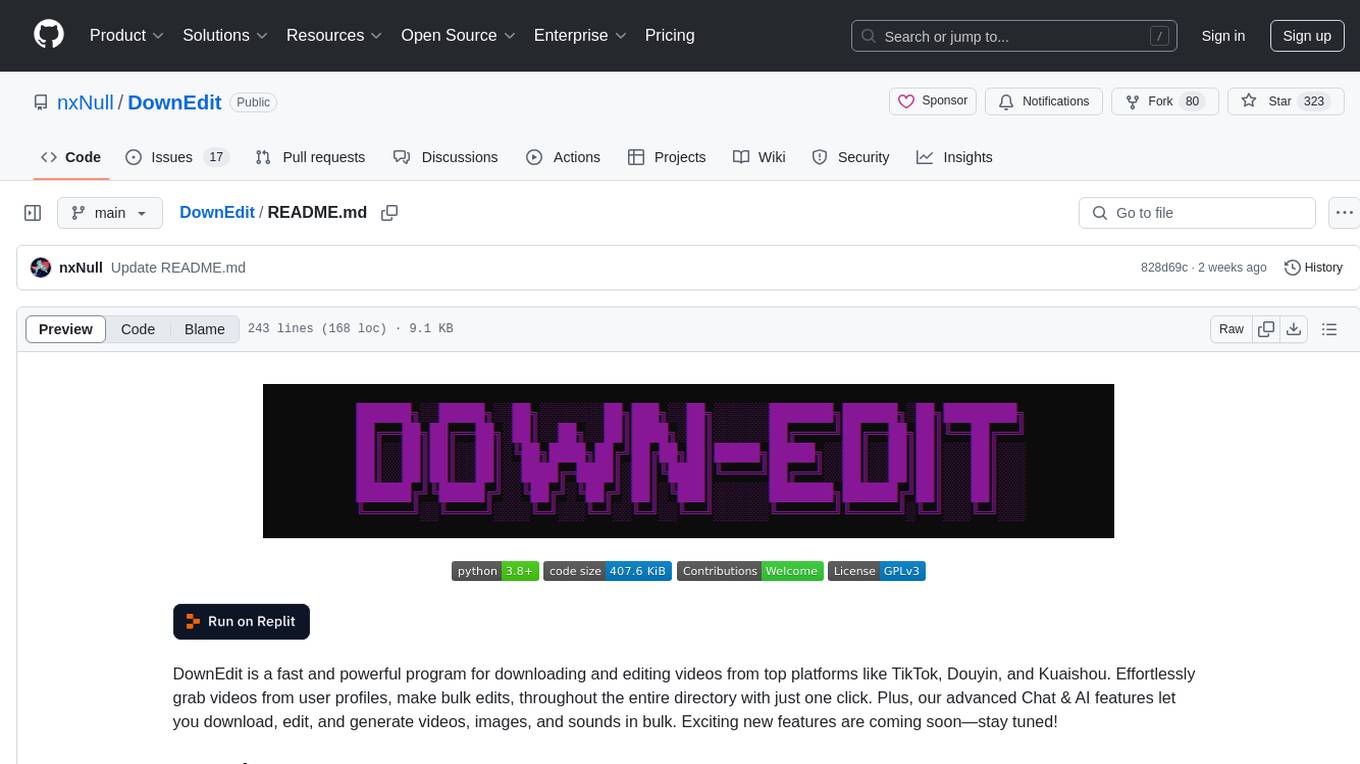
DownEdit
DownEdit is a fast and powerful program for downloading and editing videos from top platforms like TikTok, Douyin, and Kuaishou. Effortlessly grab videos from user profiles, make bulk edits throughout the entire directory with just one click. Advanced Chat & AI features let you download, edit, and generate videos, images, and sounds in bulk. Exciting new features are coming soon—stay tuned!
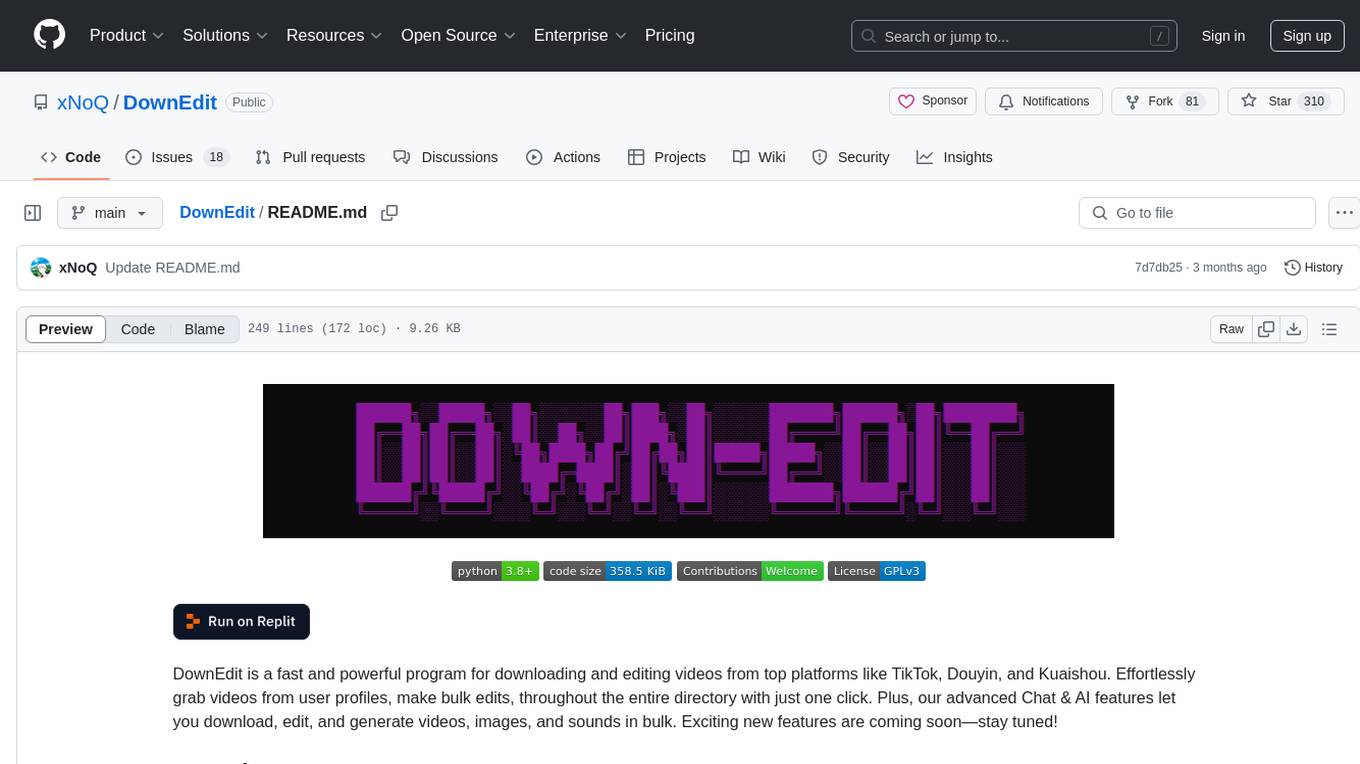
DownEdit
DownEdit is a fast and powerful program for downloading and editing videos from platforms like TikTok, Douyin, and Kuaishou. It allows users to effortlessly grab videos, make bulk edits, and utilize advanced AI features for generating videos, images, and sounds in bulk. The tool offers features like video, photo, and sound editing, downloading videos without watermarks, bulk AI generation, and AI editing for content enhancement.
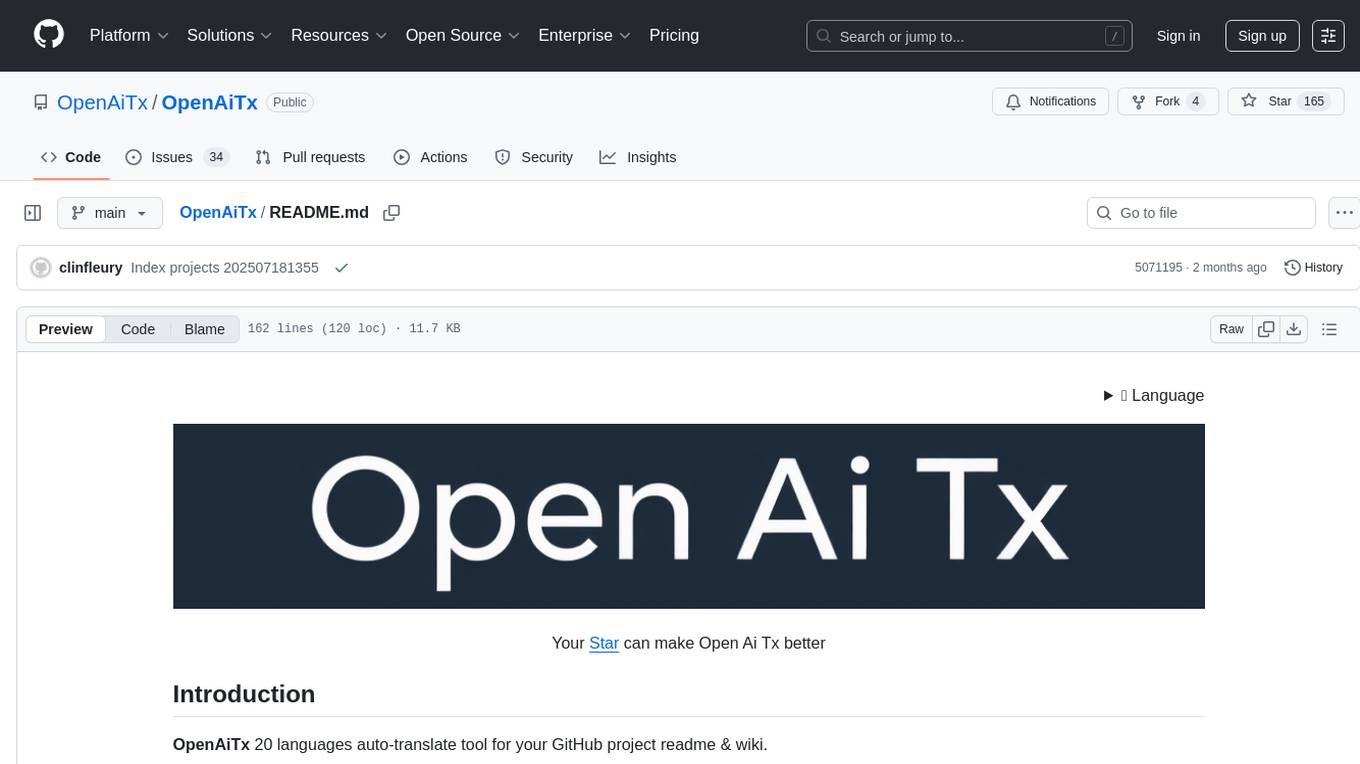
OpenAiTx
OpenAiTx is a language auto-translate tool designed for GitHub project readme & wiki. It uses premium-grade LLM for one-time translation and makes the results freely accessible to the open-source community. The tool supports Google/Bing multiple languages SEO search, which regular client translate tools cannot do. It is free and open source forever, allowing project maintainers to save time by submitting once and auto-updating in the future. OpenAiTx provides users with different style options for language display badges or text, making it easy to integrate into readme files. Contributors can participate by forking the project, cloning it, choosing a script in their preferred language, filling in their AI token, running it, and creating a pull request. It is important not to upload personal tokens for security reasons. The tool is specifically designed for GitHub markdown and aims to help users translate their projects efficiently.
For similar tasks

ai-playground
The ai-playground repository contains code from tutorials presented on the Code AI with Rok YouTube channel. It includes tutorials on using the OpenAI Assistants API v1 beta to build personal math tutors, customer support chatbots, and more. Additionally, there are tutorials on using Gemini Pro API, Snowflake Cortex LLM functions, LlamaIndex chat streaming app, Fetch.ai uAgents, Milvus Standalone, spaCy for NER, and more. The repository aims to provide practical examples and guides for developers interested in AI-related projects and tools.

promptflow
**Prompt flow** is a suite of development tools designed to streamline the end-to-end development cycle of LLM-based AI applications, from ideation, prototyping, testing, evaluation to production deployment and monitoring. It makes prompt engineering much easier and enables you to build LLM apps with production quality.
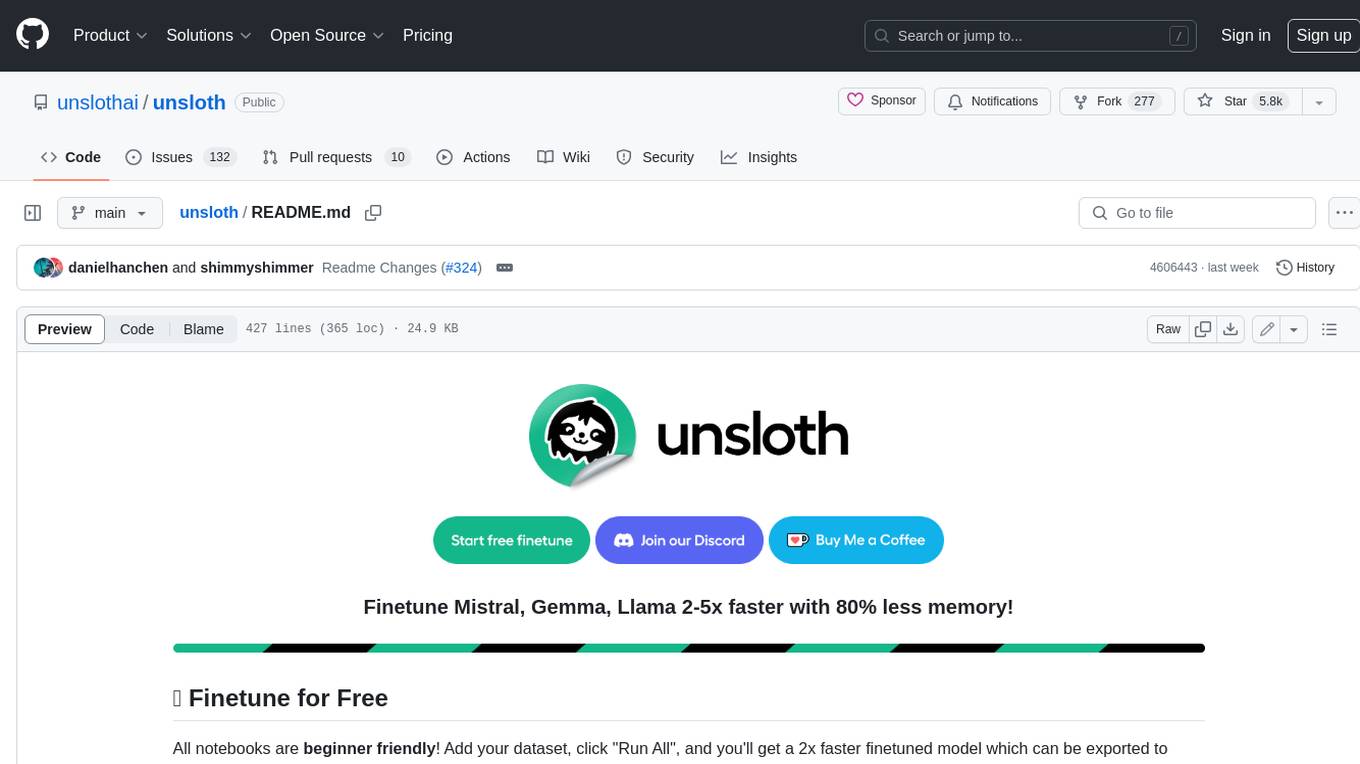
unsloth
Unsloth is a tool that allows users to fine-tune large language models (LLMs) 2-5x faster with 80% less memory. It is a free and open-source tool that can be used to fine-tune LLMs such as Gemma, Mistral, Llama 2-5, TinyLlama, and CodeLlama 34b. Unsloth supports 4-bit and 16-bit QLoRA / LoRA fine-tuning via bitsandbytes. It also supports DPO (Direct Preference Optimization), PPO, and Reward Modelling. Unsloth is compatible with Hugging Face's TRL, Trainer, Seq2SeqTrainer, and Pytorch code. It is also compatible with NVIDIA GPUs since 2018+ (minimum CUDA Capability 7.0).
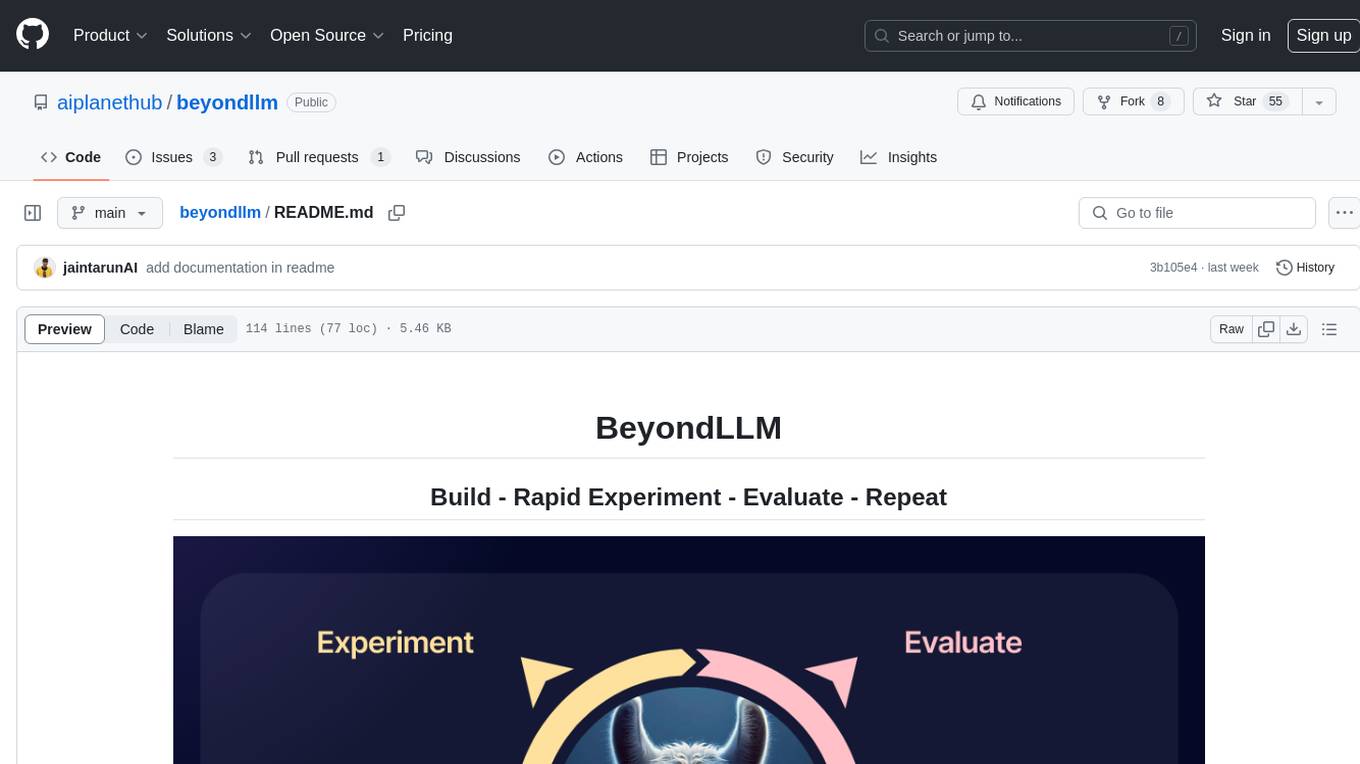
beyondllm
Beyond LLM offers an all-in-one toolkit for experimentation, evaluation, and deployment of Retrieval-Augmented Generation (RAG) systems. It simplifies the process with automated integration, customizable evaluation metrics, and support for various Large Language Models (LLMs) tailored to specific needs. The aim is to reduce LLM hallucination risks and enhance reliability.
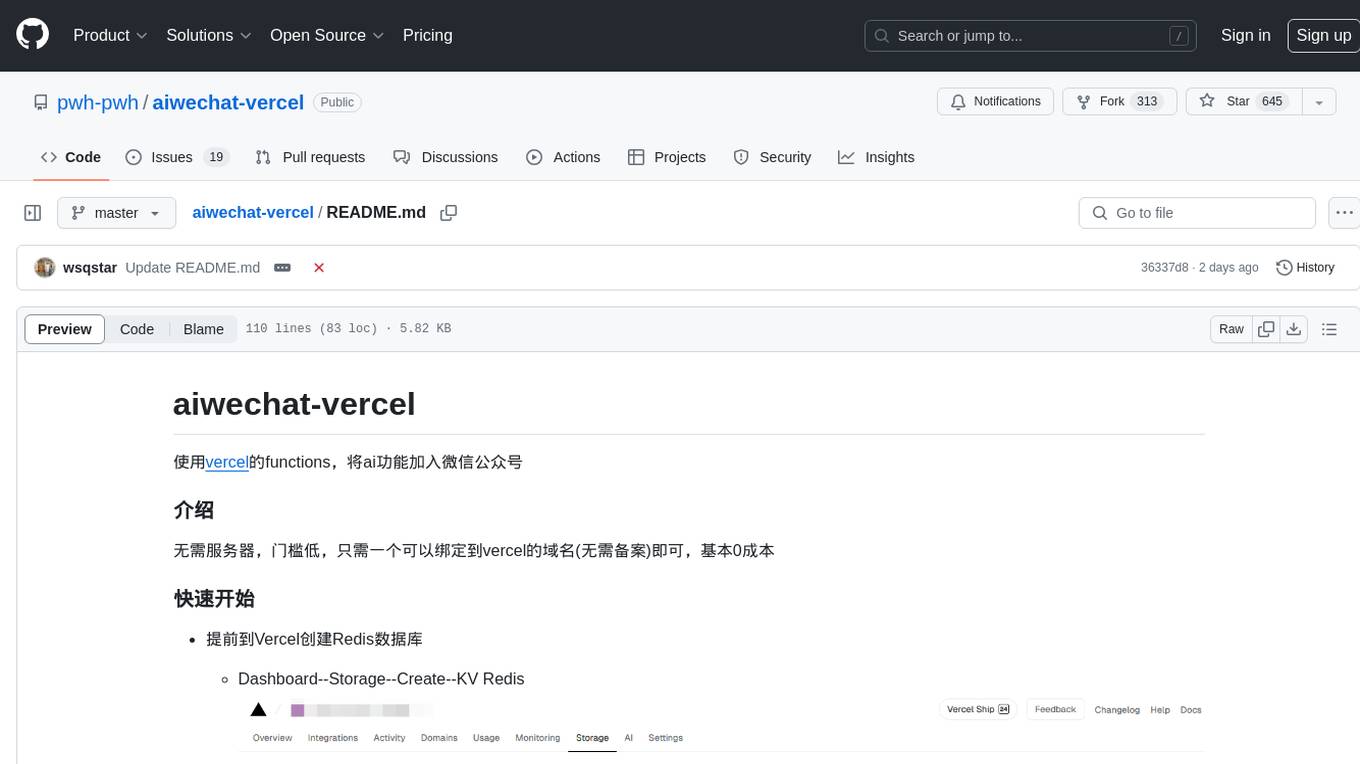
aiwechat-vercel
aiwechat-vercel is a tool that integrates AI capabilities into WeChat public accounts using Vercel functions. It requires minimal server setup, low entry barriers, and only needs a domain name that can be bound to Vercel, with almost zero cost. The tool supports various AI models, continuous Q&A sessions, chat functionality, system prompts, and custom commands. It aims to provide a platform for learning and experimentation with AI integration in WeChat public accounts.
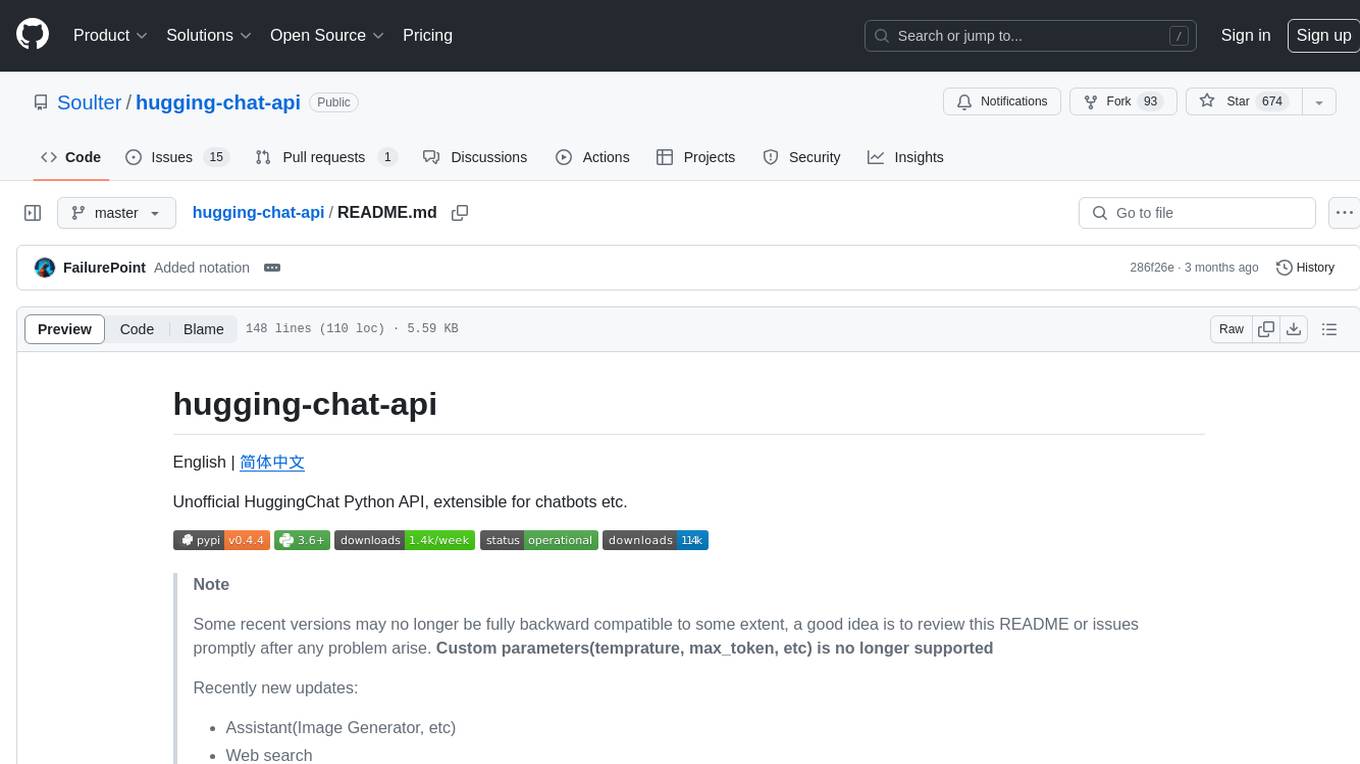
hugging-chat-api
Unofficial HuggingChat Python API for creating chatbots, supporting features like image generation, web search, memorizing context, and changing LLMs. Users can log in, chat with the ChatBot, perform web searches, create new conversations, manage conversations, switch models, get conversation info, use assistants, and delete conversations. The API also includes a CLI mode with various commands for interacting with the tool. Users are advised not to use the application for high-stakes decisions or advice and to avoid high-frequency requests to preserve server resources.
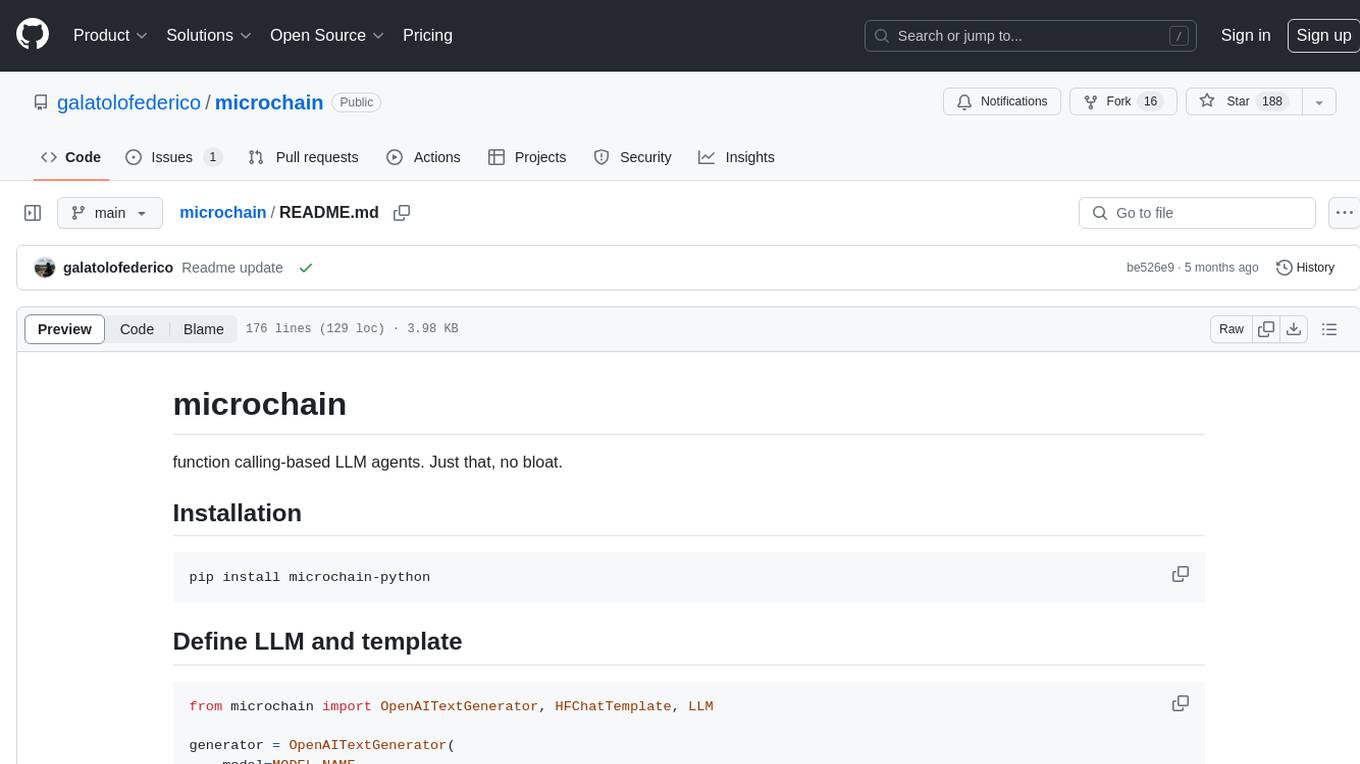
microchain
Microchain is a function calling-based LLM agents tool with no bloat. It allows users to define LLM and templates, use various functions like Sum and Product, and create LLM agents for specific tasks. The tool provides a simple and efficient way to interact with OpenAI models and create conversational agents for various applications.
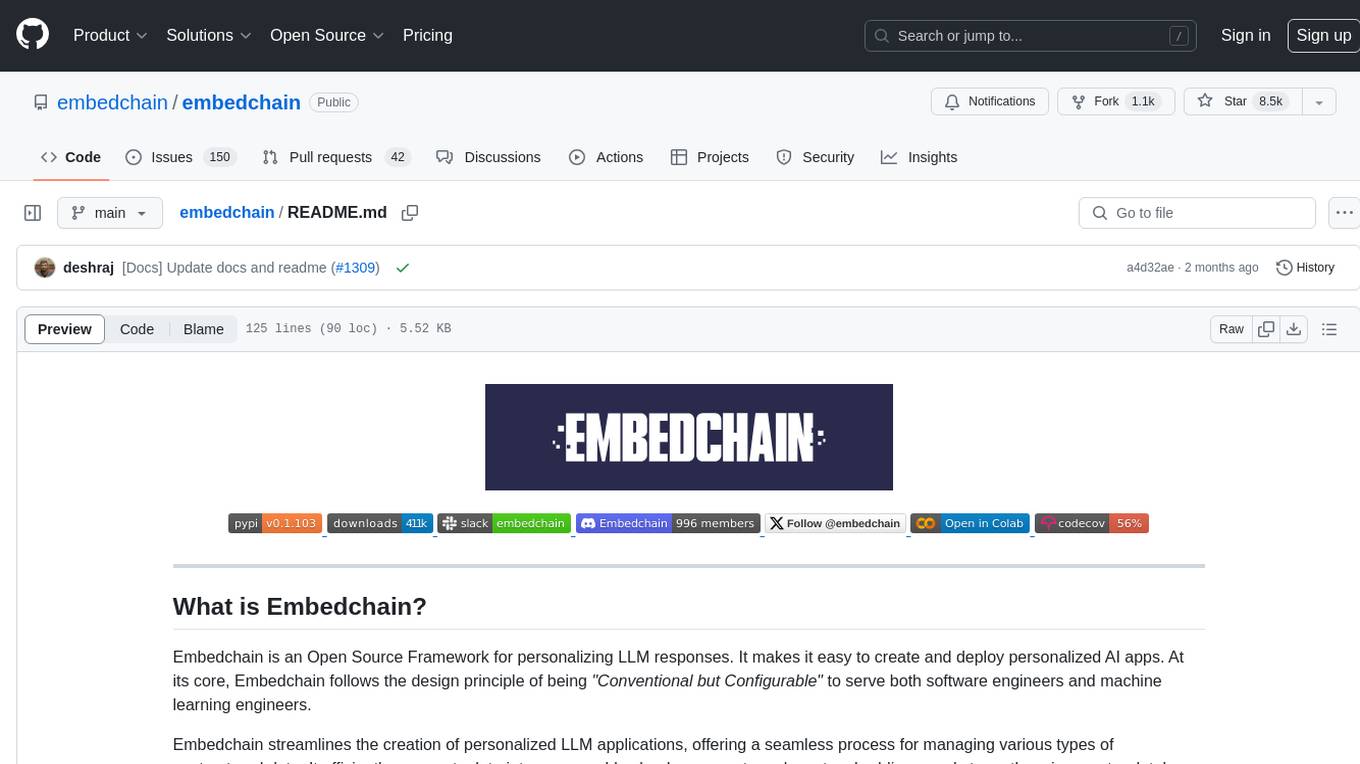
embedchain
Embedchain is an Open Source Framework for personalizing LLM responses. It simplifies the creation and deployment of personalized AI applications by efficiently managing unstructured data, generating relevant embeddings, and storing them in a vector database. With diverse APIs, users can extract contextual information, find precise answers, and engage in interactive chat conversations tailored to their data. The framework follows the design principle of being 'Conventional but Configurable' to cater to both software engineers and machine learning engineers.
For similar jobs

promptflow
**Prompt flow** is a suite of development tools designed to streamline the end-to-end development cycle of LLM-based AI applications, from ideation, prototyping, testing, evaluation to production deployment and monitoring. It makes prompt engineering much easier and enables you to build LLM apps with production quality.

deepeval
DeepEval is a simple-to-use, open-source LLM evaluation framework specialized for unit testing LLM outputs. It incorporates various metrics such as G-Eval, hallucination, answer relevancy, RAGAS, etc., and runs locally on your machine for evaluation. It provides a wide range of ready-to-use evaluation metrics, allows for creating custom metrics, integrates with any CI/CD environment, and enables benchmarking LLMs on popular benchmarks. DeepEval is designed for evaluating RAG and fine-tuning applications, helping users optimize hyperparameters, prevent prompt drifting, and transition from OpenAI to hosting their own Llama2 with confidence.

MegaDetector
MegaDetector is an AI model that identifies animals, people, and vehicles in camera trap images (which also makes it useful for eliminating blank images). This model is trained on several million images from a variety of ecosystems. MegaDetector is just one of many tools that aims to make conservation biologists more efficient with AI. If you want to learn about other ways to use AI to accelerate camera trap workflows, check out our of the field, affectionately titled "Everything I know about machine learning and camera traps".

leapfrogai
LeapfrogAI is a self-hosted AI platform designed to be deployed in air-gapped resource-constrained environments. It brings sophisticated AI solutions to these environments by hosting all the necessary components of an AI stack, including vector databases, model backends, API, and UI. LeapfrogAI's API closely matches that of OpenAI, allowing tools built for OpenAI/ChatGPT to function seamlessly with a LeapfrogAI backend. It provides several backends for various use cases, including llama-cpp-python, whisper, text-embeddings, and vllm. LeapfrogAI leverages Chainguard's apko to harden base python images, ensuring the latest supported Python versions are used by the other components of the stack. The LeapfrogAI SDK provides a standard set of protobuffs and python utilities for implementing backends and gRPC. LeapfrogAI offers UI options for common use-cases like chat, summarization, and transcription. It can be deployed and run locally via UDS and Kubernetes, built out using Zarf packages. LeapfrogAI is supported by a community of users and contributors, including Defense Unicorns, Beast Code, Chainguard, Exovera, Hypergiant, Pulze, SOSi, United States Navy, United States Air Force, and United States Space Force.

llava-docker
This Docker image for LLaVA (Large Language and Vision Assistant) provides a convenient way to run LLaVA locally or on RunPod. LLaVA is a powerful AI tool that combines natural language processing and computer vision capabilities. With this Docker image, you can easily access LLaVA's functionalities for various tasks, including image captioning, visual question answering, text summarization, and more. The image comes pre-installed with LLaVA v1.2.0, Torch 2.1.2, xformers 0.0.23.post1, and other necessary dependencies. You can customize the model used by setting the MODEL environment variable. The image also includes a Jupyter Lab environment for interactive development and exploration. Overall, this Docker image offers a comprehensive and user-friendly platform for leveraging LLaVA's capabilities.

carrot
The 'carrot' repository on GitHub provides a list of free and user-friendly ChatGPT mirror sites for easy access. The repository includes sponsored sites offering various GPT models and services. Users can find and share sites, report errors, and access stable and recommended sites for ChatGPT usage. The repository also includes a detailed list of ChatGPT sites, their features, and accessibility options, making it a valuable resource for ChatGPT users seeking free and unlimited GPT services.

TrustLLM
TrustLLM is a comprehensive study of trustworthiness in LLMs, including principles for different dimensions of trustworthiness, established benchmark, evaluation, and analysis of trustworthiness for mainstream LLMs, and discussion of open challenges and future directions. Specifically, we first propose a set of principles for trustworthy LLMs that span eight different dimensions. Based on these principles, we further establish a benchmark across six dimensions including truthfulness, safety, fairness, robustness, privacy, and machine ethics. We then present a study evaluating 16 mainstream LLMs in TrustLLM, consisting of over 30 datasets. The document explains how to use the trustllm python package to help you assess the performance of your LLM in trustworthiness more quickly. For more details about TrustLLM, please refer to project website.

AI-YinMei
AI-YinMei is an AI virtual anchor Vtuber development tool (N card version). It supports fastgpt knowledge base chat dialogue, a complete set of solutions for LLM large language models: [fastgpt] + [one-api] + [Xinference], supports docking bilibili live broadcast barrage reply and entering live broadcast welcome speech, supports Microsoft edge-tts speech synthesis, supports Bert-VITS2 speech synthesis, supports GPT-SoVITS speech synthesis, supports expression control Vtuber Studio, supports painting stable-diffusion-webui output OBS live broadcast room, supports painting picture pornography public-NSFW-y-distinguish, supports search and image search service duckduckgo (requires magic Internet access), supports image search service Baidu image search (no magic Internet access), supports AI reply chat box [html plug-in], supports AI singing Auto-Convert-Music, supports playlist [html plug-in], supports dancing function, supports expression video playback, supports head touching action, supports gift smashing action, supports singing automatic start dancing function, chat and singing automatic cycle swing action, supports multi scene switching, background music switching, day and night automatic switching scene, supports open singing and painting, let AI automatically judge the content.

